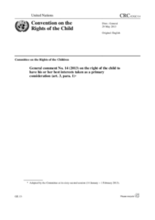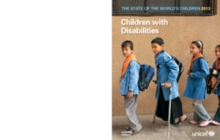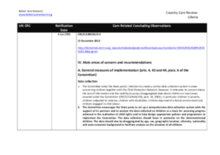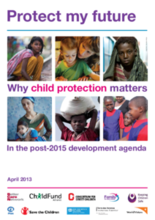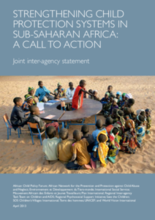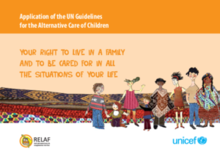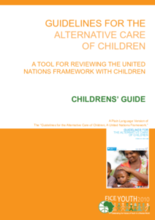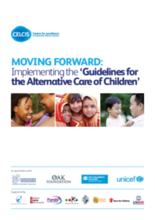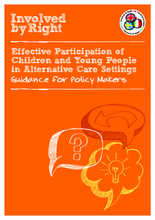Displaying 251 - 260 of 374
General Comment 14, issued by the Committee on the Rights of the Child, refers to article 3, paragraph 1, of the Convention on the Rights of the Child that asserts the right of the child to have his or her best interests taken as primary consideration in all actions or decisions that concern him or her (in both the public and private spheres).
In its 2013 State of the World’s Children Report, UNICEF has chosen to highlight the particular issues, needs, and circumstances of children with disabilities worldwide. The report includes a description of the common issues that children with disabilities face, models for inclusive policy and practice, and an agenda for action moving forward.
This country care review includes the Concluding Observations for the Committee on the Rights of the Child adopted as part of its examination of Liberia's second and fourth periodic reports at the 61st Session of the Committee held between 17 September and 5 October, 2012. The Committee’s recommendations on the issue of Family Environment and Alternative Care as well as other care relevant issues are highlighted.
This paper is the culmination of a series of inter-agency papers on the links between child protection and major development goals, designed to feed into the thematic debates around the post-2015 development framework.
Thirteen agencies working in Africa have issued a Joint Statement calling on African governments to strengthen their child protection systems to secure the right of children to a life free from violence, abuse, exploitation and neglect in both emergency and non-emergency settings.
This RELAF booklet, Application of the UN Guidelines for the Alternative Care of Children, is a child-friendly guide to the Guidelines of for the Alternative Care of Children meant for children and adolescents to inform them of their right to live with their families and make that right a reality.
This booklet from SOS Children’s Villages International was created for young people to explain in a simple manner the main points of the Guidelines for the Alternative Care of Children approved by the United Nations General Assembly in 2009. The booklet helps its young audience think about the principles of alternative care and what these mean for children and families in different situations.
This handbook, Moving Forward: Implementation of the ‘Guidelines for the Alternative Care of Children,’ is aimed at legislators, policy-makers and decision-makers, as well as professionals and care providers, to support the implementation of the Guidelines for the Alternative Care of Children, endorsed by the United Nations General Assembly in 2009. It explains the key thrusts of the Guidelines, outlines the kind of policy responses required, and describes ‘promising’ examples of efforts already made to apply them in diverse communities, countries, regions and cultures.
This Recommendation by the European Commission on Investing in Children, stresses the importance of early intervention and preventative approaches, and makes quality childcare one of its key policy areas to break the cycle of disadvantage in early years and reduce the risk of child poverty and social exclusion.
This guidance aims to raise awareness of the importance of children and young people in alternative care settings being able to make, influence and participate in decisions about their own lives, and other matters affecting them.

